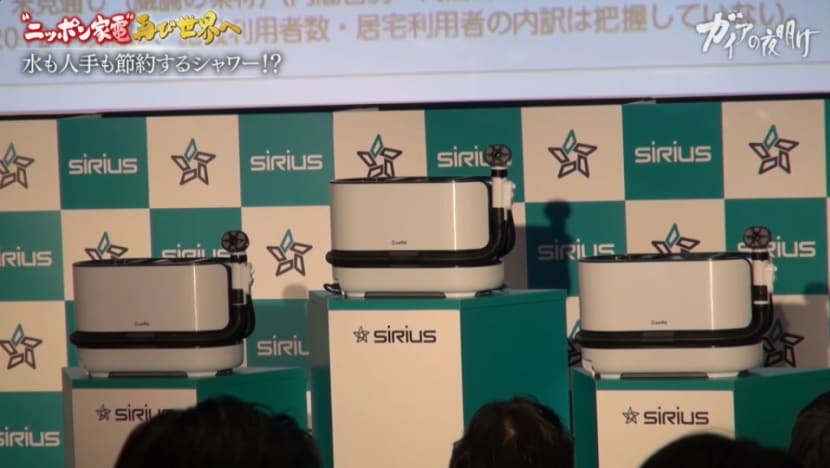Gaia Series 55 : "Nippon Home Appliances" Returning to the World
This week’s episode follows Sirius, a small but innovative Tokyo electronics firm, as they seek to revive the reputation of Japanese home electronics globally.


This audio is generated by an AI tool.
This week’s episode spotlights Sirius, a small Japanese electronics manufacturer striving to revive the reputation of Japanese home electronics through its innovative products.
In the bustling Taito Ward of Tokyo stands a tall, narrow building resembling a pencil, home to Sirius, an ambitious small electronics company. This week’s episode delves into the inspiring story of Sirius and its president, Ryuhei Kamei, as they navigate the challenges of revitalising the Japanese home electronics industry with their innovative products.
Sirius, named after the brightest star in the sky, operates with a modest team of 17 employees, with an average age of 35. Their goal is to become a guiding light in the electronics industry. The company prides itself on creating unique and practical products, such as the Switle, a device designed to clean pet stains from carpets using just tap water. This innovative product has sold over 70,000 units, priced at 10,978 JPY.
Another remarkable product from Sirius is the Virus Washer, an air purifier released during the COVID-19 pandemic. By adding water and table salt, the machine generates hypochlorous acid, known for its bacteria-killing properties. This product has sold 40,000 units and remains under 100,000 yen, demonstrating Sirius's commitment to affordability and innovation.
President Ryuhei Kamei's journey is one of resilience and passion. A former judo enthusiast, Kamei joined Sanyo at 25 but had to pivot his career path after a significant injury. Despite Sanyo's fall from grace, Kamei's experience there deeply influenced his approach to business. "I can create things thanks to the ideas I had during my Sanyo days," he shares. When Sanyo was folded into Panasonic in 2011, he declined an offer to transfer over. Instead, his spirit of innovation led him to establish Sirius with his wife, Satori, turning it into a company with annual sales of 1.2 billion yen within a decade.
The documentary highlights the launch of Sirius's latest product, the Switle Body, a groundbreaking device aimed at the healthcare industry. This all-in-one body-washing machine allows bedridden patients to be bathed efficiently and comfortably. The device uses a combination of water jets and suction to clean without spillage, a significant innovation in the field. The Switle Body requires just 10 minutes and one litre of water to wash a person, significantly reducing the typical 30 minutes and close to 1,000 litres used in traditional methods. It has a huge market: It is estimated that close to 2.3 million Japanese people require assistance in bathing.
But Kamei's vision extends beyond Japan. He is targeting countries with ageing populations, such as China, Korea, and particularly Vietnam. Vietnam's open economy and strategic position as a logistics hub within ASEAN make it an ideal market. "Vietnam has a network with ASEAN countries. If we send goods from Vietnam, they are not subject to customs tax," Kamei explains, highlighting the strategic advantage of manufacturing in Vietnam.
In Vietnam, Kamei showcases the Switle Body at Vinmec Hospital, part of the Vingroup conglomerate. The response is overwhelmingly positive. "Made-in-Japan products are incredible. They are the best in the world," comments a Vietnamese hospital representative. The product's unique capabilities, such as reducing bathing time from 30 minutes to just 10 minutes and offering a massaging function, resonate well with the healthcare professionals.
The documentary also captures Kamei's relentless drive to perfect his product. A flaw discovered in the prototype during a demonstration in Vietnam prompts immediate action. The missing rubber seal, a critical component, is identified and rectified, showcasing Sirius's commitment to quality.
Kamei's dedication to maintaining the "Made in Japan" quality standard is unwavering. "Once you lose that 'Made in Japan' image, it's hard to get it back," he asserts. This dedication is evident as Sirius aims for a monthly production of 500 units of the Switle Body, catering to both domestic and international markets.
The episode also highlights the human side of Sirius. Young employees like Mizuki Shida and Miku Hatazawa, recruited by Kamei, embody the future of the company. Their enthusiasm and commitment to spreading the word about Switle Body underscore the collective effort driving Sirius forward.
This week’s episode presents a compelling narrative of a small manufacturer with global ambitions, fighting to restore the prestige of Japanese home electronics. Kamei's journey from a judo enthusiast to a visionary entrepreneur exemplifies resilience and innovation. As Sirius continues to expand its reach, it carries the hopes of reviving a once-dominant industry, bringing Japanese home electronics to the world once again.












